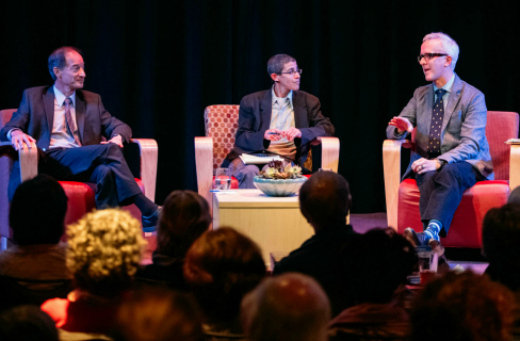Campus News
Anger as a tool for change: The role of rage and hostility in politics
“A free society is a passionate society,” UC Santa Cruz politics professor Daniel Wirls observed during ‘Anger in Politics: From the Bard to the Donald,’ the latest in the Institute for Humanities “Questions that Matter” lecture series.

“A free society is a passionate society,” UC Santa Cruz politics professor Daniel Wirls observed during “Anger in Politics: From the Bard to the Donald,” the latest in the Institute for Humanities “Questions that Matter” lecture series.
Speaking at the Kuumbwa Jazz center Tuesday evening (Oct. 18) Wirls was one of three UC Santa Cruz professors who discussed the role rage and hostility plays in the political process. Sociologist Deborah Gould also spoke and literature professor Sean Keilen facilitated the discussion.
Wirls was responding Keilen’s question on how passion shapes collective life. Keilen had been talking about Coriolanus, Shakespeare’s Roman tragedy about an angered and misunderstood war hero who seeks political leadership in a volatile state.
Shakespeare to Hamilton
Wirls pivoted from Shakespeare to Alexander Hamilton and James Madison’s Federalist Papers, a collection of 85 articles and essays that describe how a government should channel the opposing opinions and emotions that inevitably arise in a free society.
Wirls, whose research focuses on American political history, emphasized the need for a tighter relationship between the public and their elected representatives. “There is a gap between the rhetorical power of a president who will speak for us and the power a president has to get things done,” Wirls said.
He described the current political system being in a “hyper-partisan quagmire” and suggested abolishing the U.S. Senate rule requiring a supermajority vote to pass legislation to overcome the threat of filibuster. “It is a root of the failure of policy change,” he said.
“In this system, all you can can hope for is a unified government.”
For Wirls, the political system needs to be reorganized so anger can be effectively channeled. People need to feel their vote produces something and their voice is worth something, he said.
Anger as critique
“We are in a moment of capitalism that is incompatible with democracy,” said Gould, who studies political emotion and affect.
She argued there is not a lot of faith in the political system. “The political system is not dealing with the economic precarity everyone is feeling,” she said.
The result? A legitimacy crisis that is leading to cynicism, resignation, and withdrawal.
Gould pointed to the commonalities between Democratic primary candidate Bernie Sanders and GOP presidential nominee Donald Trump.
“Sanders and Trump provided a vehicle to express outrage of money taking over politics,” she said.
Referencing the work of civil rights activist and feminist writer Audre Lorde, Gould said that anger can communicate injustice and inequality. It can reveal problems impacting society and make sense of power relationships.
Authority to criticize
Anger gives authority to criticize but it can also reduce your ability to receive it, Keilen emphasized. “Shakespeare gives you access to many points of view,” he said, adding how theater allows the audience to feel a range of emotions—including being angry. Theater also provides the opportunity for the audience to experience the consequences of acting on those emotions.
As Gould said: understanding what the possibility from political outcomes can be challenging. There are risks, and the current election is revealing that, she said. While anger can challenge the status quo, you do not know what could take its place, for example a military coup or fascism.
For Gould, there is more to simply showing up to the polls to vote.
“We need to vote … and,” she said. “It’s the next day that matters.”
Gould is the author of Moving Politics: Emotion and ACT UP’s Fight Against AIDS (University of Chicago Press, 2009). She also wrote a chapter titled “Political Despair” in Politics and the Emotions: The Affective Turn in Contemporary Political Studies (Continuum, 2012).
Keilen, provost of Porter College and director of the Shakespeare Workshop, is the author of Vulgar Eloquence: On the Renaissance Invention of English Literature (Yale 2006) and an editor of The Forms of Renaissance Thought: New Essays in Literature and Culture (Palgrave 2009), as well as 10 volumes of Shakespeare criticism (Garland 1999).
Wirls is the author of The Federalist Papers and Institutional Power in American Political Development (Palgrave MacMillan, 2015) and Irrational Security: The Politics of Defense from Reagan to Obama (Johns Hopkins University Press, 2010). He is also the co-author of The Invention of the United States Senate (Johns Hopkins, 2004).
“Questions That Matter” is a public humanities series developed by UC Santa CruzInstitute for Humanities Research. “Anger in Politics: From the Bard to the Donald” was presented by the Institute for Humanities Research and Shakespeare Workshop. The talk was recorded and will be made available at: http://ihr.ucsc.edu/event/anger-in-politics.